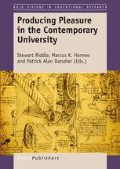Abstract
We are three women working across two Australian universities. We know the deadening, withering nature and containment of the neoliberal university. Yet, we find ourselves inspired by the wisdom of slow scholarship and recognize that with our deliberate activity with each other we have been emulating something of the cooperative reciprocity inherent in the energy-boosting-V-formations adopted by groups of flying birds.
Access this chapter
Tax calculation will be finalised at checkout
Purchases are for personal use only
Preview
Unable to display preview. Download preview PDF.
References
Barsade, S. (2002). The ripple effect: Emotional contagion and its influence on group behavior, Administrative Science Quarterly, 47, 644–675.
Barsade, S., & O’Neill, A. (2016). Manage your emotional culture. Harvard Business Review, January– February. Retrieved from https://hbr.org/2016/01/manage-your-emotional-culture
Berg, M., & Seeber, B. (2016). The slow professor: Challenging the culture of speed in the academy. Canada: University of Toronto Press, Scholarly Publishing Division.
Black, A. L. (2015). Authoring a life: Writing ourselves in/out of our work in education. In M. Baguley, Y. Findlay, & M. Kerby (Eds.), Meanings and motivation in education research (pp. 50–71). London, UK: Routledge.
Brennan, T. (2004). The transmission of affect. Ithaca: Cornell University Press.
Burrows, R. (2012). Living with the H-Index? Metric assemblages in the contemporary academy. The Sociological Review, 60, 2, 355–372.
Catano, V.M., Francis, L., Haines, T., Kirpalani, H., Shannon, H., Stringer, B., & Lozanski, L. (2010). Occupational stress in Canadian universities: A national survey. International Journal of Stress Management, 17, 232–258.
Collini, S. (2012). What are universities for? London: Penguin.
Csikszentmihalyi, M. (1990). Flow: The psychology of optimal experience. New York: Harper & Row.
Fredman, N., & Doughney, J. (2011). Academic dissatisfaction, managerial change and neo-liberalism, Higher Education, 64(1), 41–58. doi: 10.1007/s10734-011-9479-y
Gill, R. (2010). Breaking the silence: The hidden injuries of the Neoliberal University. In R. Ryan- Flood & R. Gill (Eds.), Secrecy and silence in the research process: Feminist reflections (pp. 228–244). Abingdon: Routledge.
Grant, A. (2014). Give and take: Why helping others drives our success. A revolutionary approach to success. London: Orion Publishing Co.
Husu, L. (2001). Sexism, support and survival in Academia: Academic women and hidden discrimination in Finland. Finland: University of Helsinki.
Lee, F. S. (2007). The research assessment exercise, the state and the dominance of mainstream economics in British universities. Cambridge Journal of Economics, 31, 309–325.
Lynch, K. (2010). Carelessness: A hidden doxa of higher education. Arts and Humanities in Higher Education, 9(1), 54–67.
Mijs, J. J. B., Bakhtiari, E., & Lamont, M. (2016). Neoliberalism and symbolic boundaries in Europe: Global diffusion, local context, regional variation. Socius: Sociological Research for a Dynamic World, 2 (January–December).
Mountz, A., Bonds, A., Mansfield, B., Loyd, J., Hyndman, J., Walton-Roberts, M., Basu, R., Whitson, R., Hawkins, R., Hamilton, T., & Curran, W. (2015). For slow scholarship: A feminist politics of resistance through collective action in the neoliberal university. ACME: An International E-Journal for Critical Geographies, 14(4), 1235–1259. Retrieved from http://ojs.unbc.ca/index.php/acme/article/view/1058
O’Neill, M. (2014). The slow university: Work, time and well-being. Forum Qualitative Sozialforschung/Forum: Qualitative Social Research, 15, 3. Retrieved from http://www.qualitativeresearch.net/index.php/fqs/article/view/2226/3696 (accessed 9 June 2016).
Parkins, W., & Craig, G. (2006). Slow living. Oxford: Berg.
Pereira, M. M. (2015). Struggling within and beyond the Performative University: Articulating activism and work in an “academia without walls”. Women’s Studies International Forum, http://dx.doi.org/10.1016/j.wsif.2015.06.008
Portugal, S. J., Hubel, T. Y., Fritz, J., Heese, S., Trobe, D., Voelk, B., Hailes, S., Wilson, A. M., & Usherwood, J. R. (2014). Upwash exploitation and downwash avoidance by flap phasing in ibis formation flight, Nature, 501, 399–404. http://dx.doi.org/10.1038/nature12939
Scott-Maxwell, F. (1979). The measure of my days. New York: Penguin.
Stachowiak-Kudła, M., & Kudła, J. (2015). Financial regulations and the diversification of funding sources in higher education institutions: Selected European experiences. Studies in Higher Education. doi: 10.1080/03075079.2015.1119109
Tippet, K. (2016). Becoming wise: An inquiry into the mystery and art of living. London: Penguin.
Voelkla, B., Portugald, S. J., Unsölde, M., Usherwoodd, J. R., Wilson, A. M., & Fritz, J. (2015). Matching times of leading and following suggest cooperation through direct reciprocity during Vformation flight in ibis. Proceedings of the National Academy of Sciences of the United States of America, 112(7), 2115–2120.
Zuidervaart, L. (2011). Living at the crossroads: Ethical scholarship and the common good. http://faculty.icscanada.edu/lzuidervaart/files/cprse-inaugural-address (accessed 9 June 2016).
Author information
Authors and Affiliations
Editor information
Editors and Affiliations
Rights and permissions
Copyright information
© 2017 Sense Publishers
About this chapter
Cite this chapter
Black, A.L., Crimmins, G., Jones, J.K. (2017). Reducing the Drag. In: Riddle, S., Harmes, M.K., Danaher, P.A. (eds) Producing Pleasure in the Contemporary University. Bold Visions in Educational Research. SensePublishers, Rotterdam. https://doi.org/10.1007/978-94-6351-179-7_11
Download citation
DOI: https://doi.org/10.1007/978-94-6351-179-7_11
Publisher Name: SensePublishers, Rotterdam
Online ISBN: 978-94-6351-179-7
eBook Packages: EducationEducation (R0)

